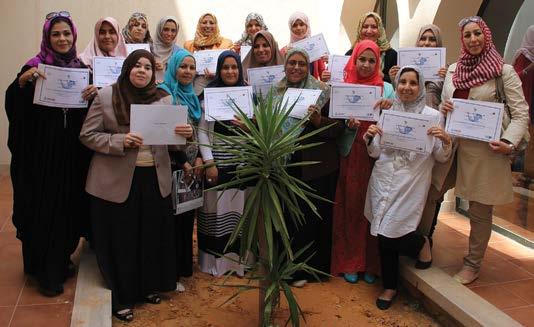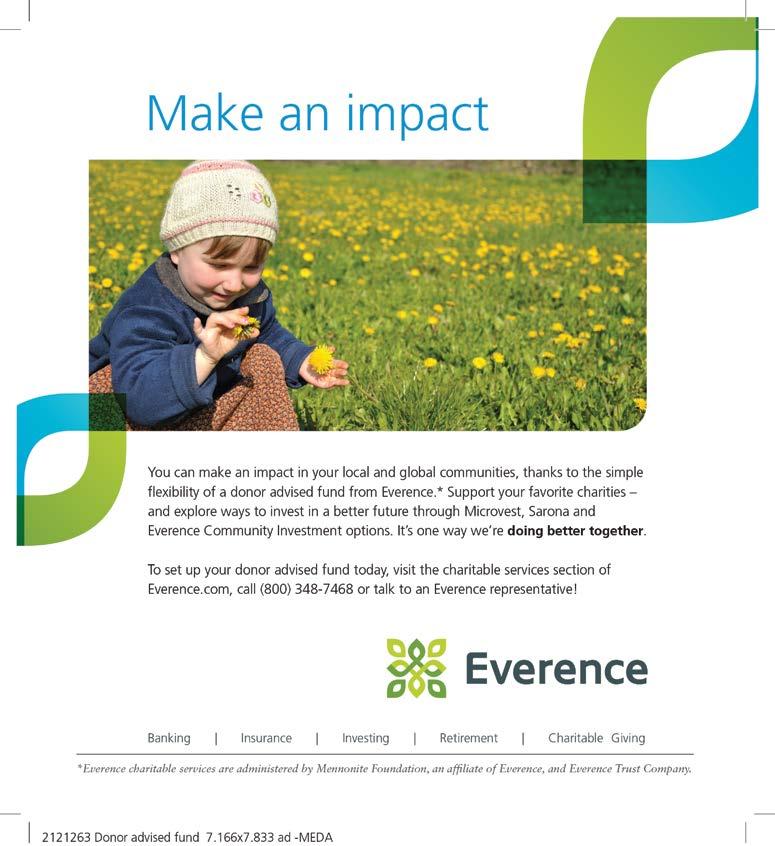
5 minute read
News
First women graduate from new Libya program
MEDA recently celebrated the graduation of its first training group from the Libya Women Economic Empowerment (LWEE) project.
Advertisement
LWEE, reaching 210 women entrepreneurs with job-creating opportunities for an additional 700 individuals, is jointly funded by USAID and MEDA supporters and is implemented in partnership with three local organizations: Phoenix, Libyan Women Forum and Consultants Alliance.
The 20 entrepreneurial women who completed the month-long business training course can now move forward with their business ideas.
Business opportunities for women in Libya have traditionally been limited. MEDA received 300 applications for the 20 spots available in the first class.
In gratitude for being able to participate, the women planted a tree in the office garden and called it Hope. “It symbolizes their hope in improving their life and achieving success as Libyan women entrepreneurs following the fundamental training they received,” explains Intissar Rajabany, MEDA’s project manager in Libya.
Another 180 women are expected to graduate by the end of the two-year project. LWEE staff will provide ongoing mentorship and networking to keep in touch with graduates. Through a business plan competition, the project will provide matching grants to fund some of the top ideas submitted.
Although LWEE is in its early days, Intissar reports it is already having a big impact. “The changes we’ve seen in the attitude and behavior of the
Would you like to comment on anything in this magazine, or on any other matters relating to business and faith? Send your thoughts to
wkroeker@meda.org Some of the first graduates of MEDA’s new Libya program, shown with the tree they planted to celebrate their fresh start.
women as compared to four weeks earlier are 180 degrees different. As much as these are motivated women who have sacrificed time to do this, they are more outgoing in their outlook, they are wearing brighter colors, they are very comfortable with the male trainers and they are just full of life and vitality.” — Jaclyn Stief, MEDA news service
It won’t be fought with water pistols
How close are we to seeing major battles waged over water? Closer than we used to be, says geostrategist Brahma Chellaney.
An “increasingly parched world” raises the possibility that water could become a weapon of war or a tool for terrorism, he writes in the Globe & Mail. “Water is becoming the world’s next major security and economic challenge.”
Wherever water is scarce, there’s conflict in the making. “Unclean water is the greatest killer on the globe, yet a fifth of humankind still lacks easy access to potable water,” Chellaney writes. “More than half of the global population lives under water stress — a figure projected to increase to two-thirds during the next decade.”
A paradox about water is that it is a life preserver “but it can also be a life destroyer when it becomes a carrier of deadly bacteria or comes in the deluge of a tsunami, a flash flood or a hurricane.”
He notes soberly that “There are substitutes for many resources, including oil, but none for water.”
The single biggest driver of water stress is growth in consumption, says Chellaney. “Rising incomes, for example, have promoted richer diets, especially a greater intake of meat, whose production is notoriously water-intensive... it is about 10 times more waterintensive to produce beef than to produce cereals.”◆
Study claims it’s harder to be smart when you’re poor
Being poor can take a lot of mental energy, so much that your IQ can drop as much as 13 points.
That’s the finding of a new study that claims minds preoccupied with cash woes function less efficiently and have trouble making good decisions.
The five-year study, published in the journal Science, ran two different sets of tests — one on 464 smallholder farmers in India, and the other on shoppers in a New Jersey mall.
In India, farmers were given psychological tests before the harvest, when most were poor. Then they were tested again after the harvest when wallets were full. Post-harvest, when they had fewer financial stresses, the farmers answered test questions faster and more accurately, recording IQ scores up to 25 percent higher than previously.
The New Jersey mall study tested 400 shoppers to see how they responded to an unexpected car repair bill. If the bill was small, those shoppers who earned $20,000 a year responded much the same as those who earned $70,000. But when the bill was large, the poorer folk had more difficulty thinking logically and solving problems. Some of their IQ scores plunged 40 percent.
The scientists, from Har-
Everence Lancaster receives ethics award
The Everence Financial office in Lancaster, Pa., has received a 2013 Ethics in Business Award at an Ethics in Business Forum co-sponsored by the Lancaster Chamber of Commerce & Industry.
The Samaritan Counseling Center, which presented the award, cited the organization as one that “stands apart in its dedication to corporate social responsibility in its employment practices, civic activities, environmental concern and ethical conduct.”
Everence Lancaster was among 30 nominees for the award. The annual forum brings together business professionals from many industries to share best practices and learn more about incorporating ethics into their business models. Keynote speaker was leadership specialist Bruce Weinstein, author of the book Ethical Intelligence.
A panel of community leaders chooses the award recipient based on a process that includes submitted information, on-site visits and interviews, and an online employee survey.
“We are honored to be chosen for this award that reflects how we do business and the priority we place on acting responsibly,” said Everence Lancaster spokesman Doug Umble.
Everence, a ministry of the Mennonite Church USA, helps individuals, organizations and congregations integrate finances with faith. It offers banking, insurance and financial services with community benefits and stewardship education.◆ vard, Princeton and the University of British Columbia, concluded that financial stress monopolizes thinking and makes other calculations slower and more difficult. This “money-and-brain crunch” applies in some form to 100 million North Americans who face financial squeezes, they said.
“When we think about people who are financially stressed, we think they are short on money, but the truth is they are also short on cognitive capacity,” says one of the study’s authors. He added that people who are always thinking about overdue bills or rent cannot focus properly on other things. Thus, being late on loans could cost them both interest points and IQ points. (Vancouver Sun, Associated Press)




